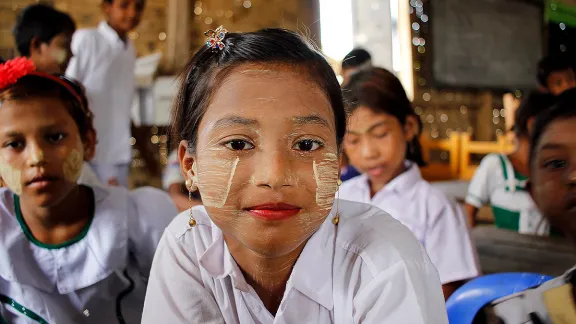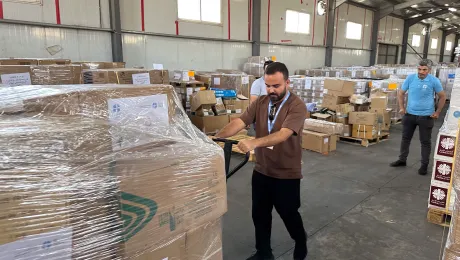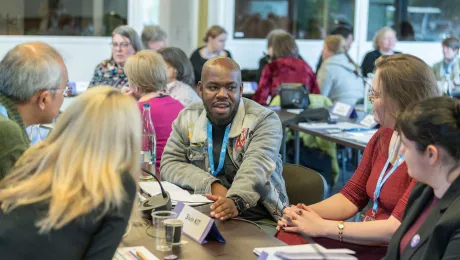
The prospect of a better education is more likely for Ma Khin Nu, seven, a resident of the Ohn Taw Gyi camp, Myanmar. Photo: LWF Myanmar/Isaac Kyaw Htun Hla
LWF provides education for children excluded from formal system
(LWI) - Seven-year old Ma Khin Nu flashes a big smile when she enters the Lutheran World Federation’s (LWF) temporary learning center in Ohn Taw Gyi camp, Myanmar. The bright eyed student looks radiant in a colorful skirt and white blouse. Her face is painted with white swirls, known as thanaka or traditional make-up, protecting her skin from the unforgiving sun. She sports a pair of gold earrings and a butterfly hair clip.
Ma Khin and her two younger siblings are among the 32,000 children who benefit from LWF’s Education for Change program, operated in the troubled Rakhine state of Myanmar. “I love going to school,” the young student says. “I have lots of friends here and I can study, draw pictures, recite poems and play with toys.” The seven-year-old dreams of becoming a teacher herself. “I enjoy school so much I want to make other children happy while learning,” she explains.
I love going to school. I have lots of friends here and I can study, draw pictures, recite poems and play with toys.
Ma Khin’s dream is not an obvious one. The grade five student is one of the estimated 140,000 displaced Muslims in Rakhine, living in some 60 different camps. In Ma Khin’s camp alone, there are close to 12,000 people. Under Myanmar law, Rohingya are not entitled to citizenship rights. Without a birth certificate, children like Ma Khin have little or no access to public schools or formal vocational training.
Committed to support children such as Ma Khin, LWF recently launched a new phase of its education program in Rakhine. In this phase, more than 400 teachers in close to 100 formal and informal educational facilities will be supported. The project is funded by the European Commission and the European Commission’s Directorate-General for International Cooperation and Development. Extra funding is provided by the Church of Sweden, through ACT Alliance, and Australian Lutheran World Service.
Through this partnership, informal facilities, such as temporary learning centers and child friendly spaces, are set up. Essential school furniture and water and sanitation facilities are provided by the project. In order to build and repair classrooms, LWF involves school and camp coordination committees, as well as parent and teacher associations.
Education provides a firm foundation
Conditions at Ohn Taw Gyi are tough. Ma Khin’s family arrived there after a long ride on a dangerously overcrowded boat. Since hostilities between Muslims and Buddhists broke out in 2012, and again in 2017, children like Ma Khin have been swept away from their communities, in an exodus that led three quarters of all Muslims to flee to camps in Rakhine or neighboring Bangladesh. Ma Khin’s family lives in a room in a dilapidated bamboo house, shared with seven other families. Lives are cramped and without privacy. Residents are not allowed to leave the camp.
Education is essential for children like Ma Khin, not only because it provides them a foundation for the future but because it gives them a chance to forget their worries and explore their creative talents.
“Before we didn’t have a child friendly space in the camp and we couldn’t afford to buy toys. Now children can interact with their friends and play with many toys at a safe location,” says teacher Daw Khin Than. Her own five-year-old joins her every day. “I am so happy to see my daughter drawing pictures, reciting poems and singing songs. She has improved a lot in the past months. That’s why I am very happy with the support that LWF is providing to the children of our camp.”
LWF has been active in Myanmar for 10 years, assisting vulnerable communities in Rakhine state during emergencies and with water, sanitation and hygiene programs, food and livelihood security, and workshops on human rights and disaster risk reduction.
At present, education and vocational training are the largest LWF programs in Ohn Taw Gyi. Through the project, LWF promotes equitable education for girls and boys and their communities to fulfil their full potential and to enjoy a better quality of life. The project aims to provide equal access to education for all children in Rakhine, irrespective of religion or ethnicity.


